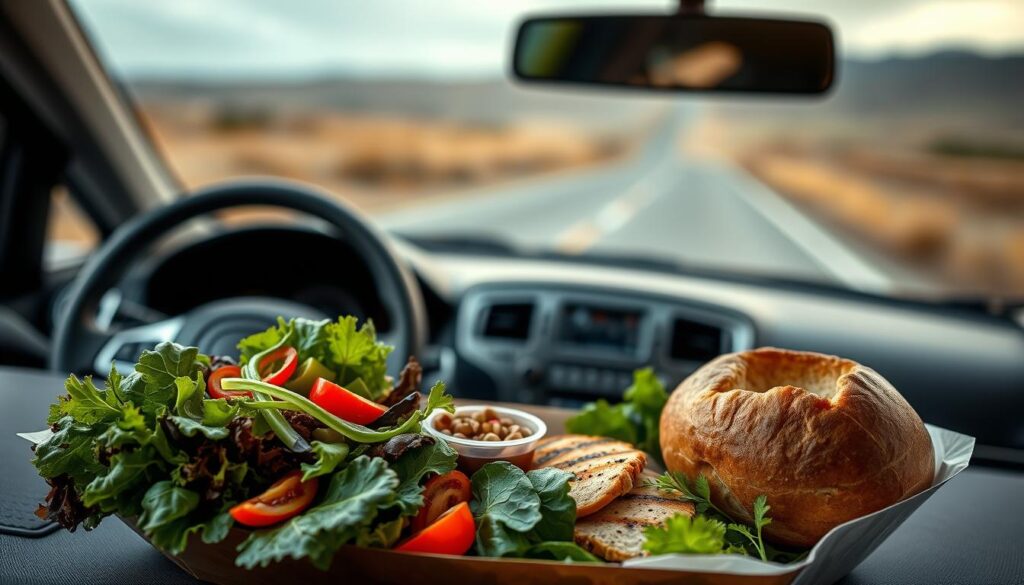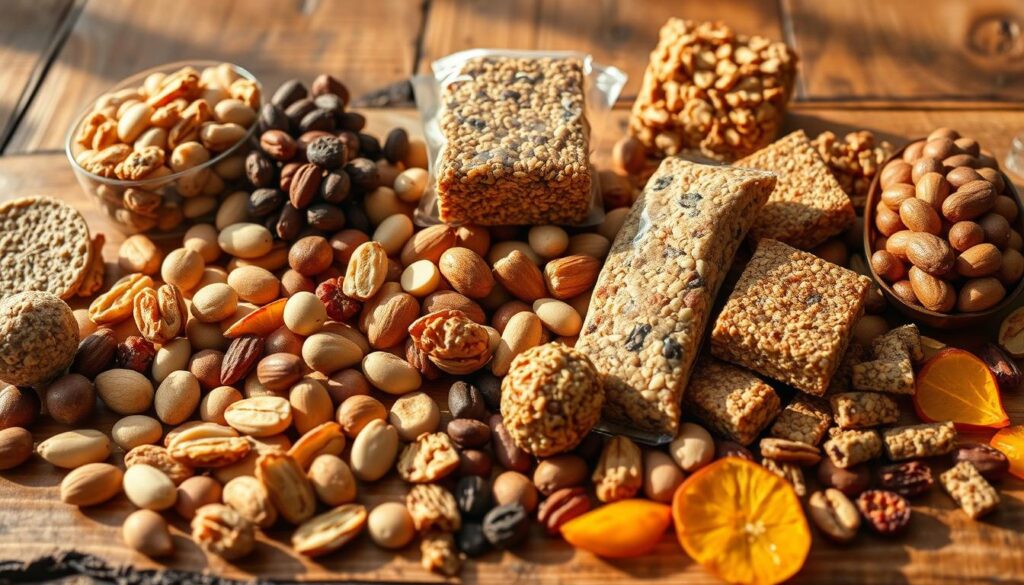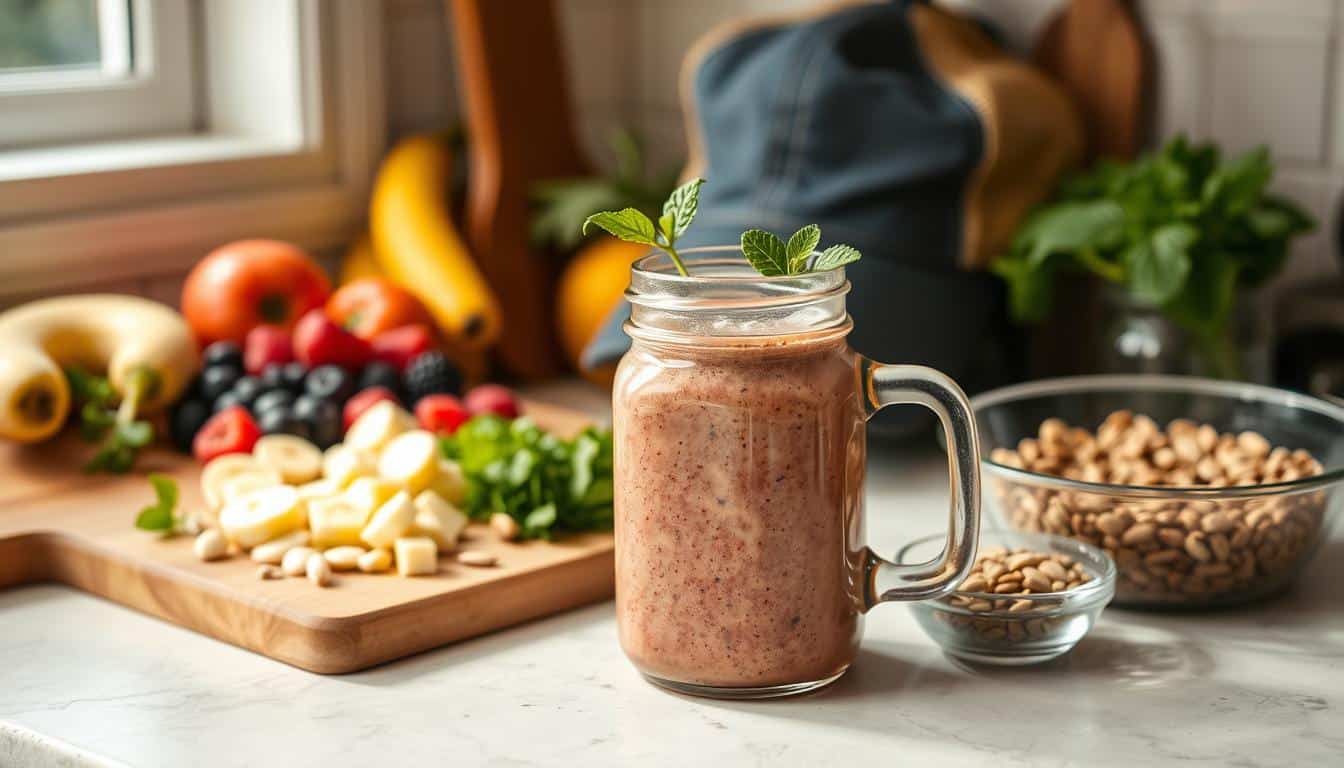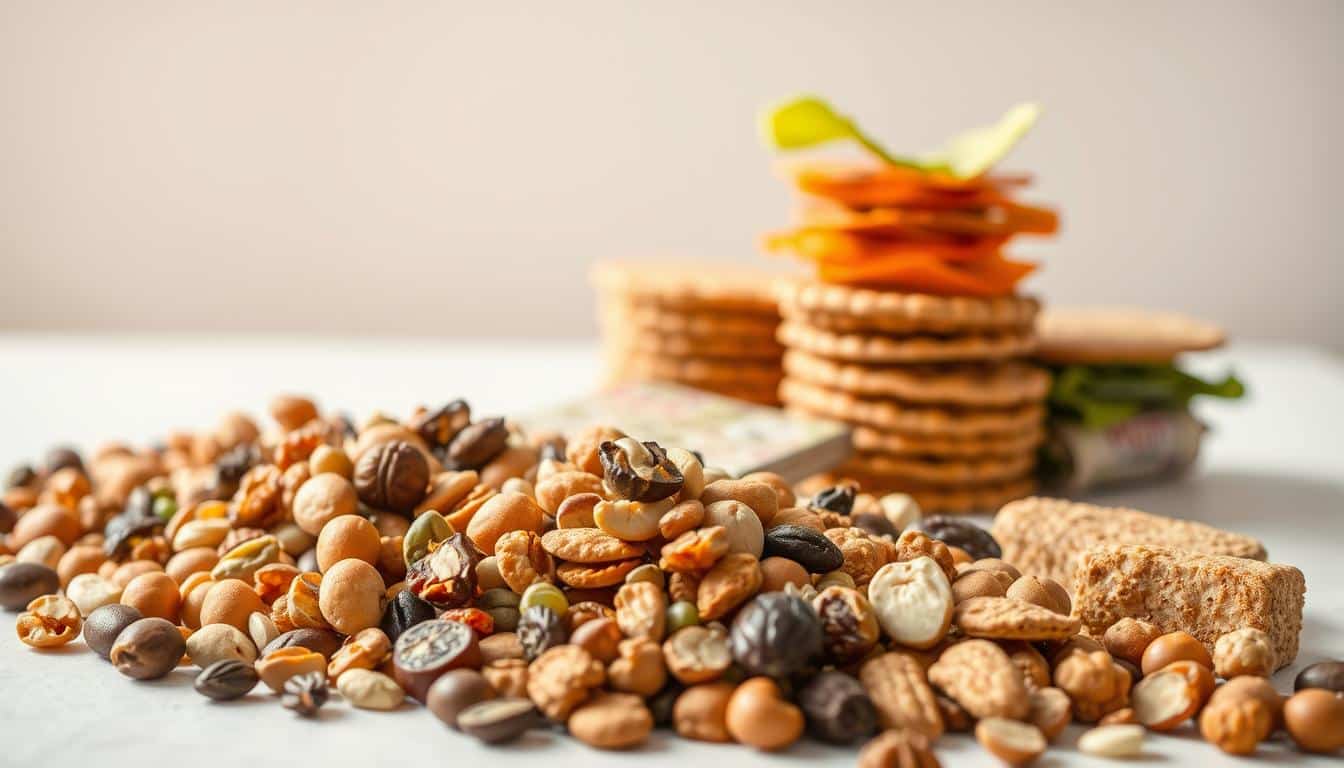Long-haul driving is tough, and eating right is key for success. Good eating habits help keep truck drivers healthy and sharp on the road. Making smart food choices boosts alertness and cuts down on health risks.
This guide offers vital nutrition tips. It helps drivers focus on their health and do well on long trips.
Understanding the Importance of Nutrition on the Road
For long-distance drivers, eating right is key to staying sharp and healthy. Many truck drivers find it hard to get fresh food while traveling. Knowing about nutrition is very important for them. Eating a balanced diet keeps your energy up, mood good, and helps prevent sickness. This is all very important for safe driving.
Nutrition is super important. Eating well helps you stay alert and cuts down on health problems later on. It’s crucial for drivers to make smart food choices, especially because bad eating habits can be extra risky for them. A healthy diet makes you feel better and makes the road safer for everyone.
The Impact of Diet on Driving Performance
Driving far requires physical strength and mental clarity. What you eat plays a big role in your driving ability. Choosing the right foods can keep your focus sharp and alertness high on the road. A mix of complex carbs, proteins, and healthy fats keeps energy levels steady. This balance is key to avoid tiredness and stay alert while driving.
Maintaining Focus and Alertness
Eating right is crucial for safe driving. Foods that provide long-lasting energy help the brain work best. Whole grains, fruits, and nuts boost focus. But, foods full of sugar or bad fats make you slow and less responsive. This can make long drives riskier.
The Connection Between Nutrition and Safety
What you eat affects how well you can react on the road. A good diet boosts reaction times and decision-making. Bad eating habits hurt your brain function, putting everyone at risk. Making healthy food choices improves driving and makes roads safer.
Key Components of Balanced Nutrition for Long-Distance Drivers
For long-distance drivers, knowing what makes up a balanced diet is key. Focus on the big three: carbohydrates, proteins, and fats. Each has a special job in maintaining your energy and health during long drives.
Macronutrients: Carbs, Proteins, and Fats
Carbohydrates are your main energy source. They help keep both your body and mind going. Choose complex carbs like whole grains, fruits, and veggies for lasting energy.
Proteins help repair muscles and keep your body working well. Add lean meats, beans, and nuts to your diet. Healthy fats, found in foods like avocados, olive oil, and fish, are also key for energy. Make sure to balance these macronutrients for the best driving performance.
Micronutrients: Vitamins and Minerals
Vitamins and minerals are crucial for staying healthy on the road. Eat lots of fruits and vegetables for these micronutrients. They give you Vitamin C for your immune system and Vitamin D for strong bones.
Minerals like potassium and magnesium help muscles work better and fight tiredness. Focus on eating nutrient-rich foods to stay alert and energized on your drive. This variety in your diet will help boost both your driving ability and health.
Staying Hydrated: The Core of Health
It’s vital to keep hydrated for overall health. This is especially true for long-distance drivers. They often forget to drink water during long trips. Drinking enough water helps you perform better and feel good while driving.
How Much Water Should You Drink?
The Mayo Clinic recommends eight glasses of water a day. But drivers might need more, depending on things like how active they are or the weather. Having a water bottle close by reminds drivers to drink often. This keeps them well-hydrated on the road.
The Effects of Dehydration on Performance
Dehydration can harm your driving. It can make it harder to focus, slow your reactions, and tire you out. These issues make it tough to stay sharp and aware on the road. Drinking water often is key to better performance and safety. It keeps tiredness away, making the roads safer for everyone.
Healthy Meal Planning for Long Hauls
Meal planning is key for truck drivers to stay healthy on long trips. Planning your meals can help boost your energy and health. It saves time and lets you have healthy food options, avoiding fast food.
Strategies for Prepping Your Meals
There are important steps for truck drivers’ meal planning:
- Batch cook healthy meals at home to take for the week.
- Use containers that are simple to store and reheat.
- Add a mix of proteins, whole grains, and veggies to your meals.
- Set specific prep times to keep your meal prep consistent.
Convenient and Nutritious Snack Options
Snacking is crucial for keeping your energy up on long drives. Try these healthy snacks:
- Mixed nuts for protein and healthy fat.
- Fresh fruits like apples and bananas for quick energy.
- Greek yogurt high in protein to keep you full.
- Whole-grain crackers for fiber and lasting energy.
With smart meal planning and healthy snacks, drivers can improve their nutrition on the road.
Balanced Nutrition for Long-Distance Drivers
Drivers who go long distances need to think carefully about their food. They must balance convenience with nutritious choices to stay healthy. Planning meals and making smart choices at stops are key for energy and focus while driving.
Balancing Convenience with Nutrition
Eating well can be hard when you’re always on the move. It’s tempting to grab quick snacks that may not be very nutritious. But, with some planning, you can have meals that are both convenient and healthy. Wrap whole grains, lean proteins, and veggies for a balanced dish. Or, try salads with chicken or tuna. Snacks like nuts, yogurt, or fruit are good for energy all day.
Portion Control Tips on the Road
Keeping an eye on how much you eat is vital, especially on the road. Using individual snack bags helps avoid overeating. Pay attention to how much you eat, particularly with snacks like trail mix or energy bars. Here are some useful tips:
- Prepack snacks into smaller bags to limit choices.
- Avoid eating directly from bulk containers.
- Set specific times for snacks to minimize mindless eating.
- Drink water regularly to gauge true hunger versus thirst.

The Role of Vitamins and Supplements
For long-distance drivers, staying healthy is vital, especially with job challenges. Vitamins for truck drivers fill nutritional gaps due to limited fresh food access. Emphasizing the importance of supplements is key for energy and well-being.
Essential Vitamins for Drivers
Several vitamins are crucial for driver health, including:
- Vitamin D: Vital for immune function and bone health.
- Omega-3 fatty acids: Benefit cardiovascular health and lower inflammation.
- Vitamin B complex: Boosts energy and fights fatigue.
- Vitamin C: Important for the immune system, especially in close quarters.
When to Consider Supplements
Drivers should look at their diet to see if dietary supplements could help. Talking to a healthcare pro can pinpoint needs based on life, driving patterns, and health goals. Regular checks address nutrient shortages, keeping drivers alert and healthy on the road.
Avoiding Common Diet Pitfalls
Long-distance drivers often struggle with eating well. They’re tempted by fast food because it’s quick. But, eating these high-calorie, fat-laden meals often can lead to obesity and heart disease.
Fast Food and Its Health Consequences
Fast food draws in drivers with its quick service. But its nutritional value is low. Eating these calorie-heavy but nutrient-poor meals can make drivers feel tired and sluggish. Knowing about these effects helps drivers choose healthier options when traveling.
Recognizing Hidden Sugars and Fats
It’s hard for drivers to spot added sugars and bad fats in processed foods. Some snacks that seem healthy are not. Learning to understand food labels helps drivers pick better snacks and meals. Choosing foods with simple ingredients and less salt is key for their health and energy on the road.
Maintaining Energy Levels with Snack Choices
It’s key to keep your energy up during long drives. Choosing the right snacks can boost nutrition for drivers. Adding energy-boosting snacks to your routine makes a big difference.
Healthy Snack Ideas for Long Drives
Pick snacks that fuel your body and give balanced nutrition for the road. Here are some top choices:
- Fresh fruits such as apples, bananas, and oranges
- Nuts and seeds, providing healthy fats and protein
- Protein bars for a convenient source of energy
- Hard-boiled eggs, rich in proteins
These snacks are not only healthy but also easy to make and bring along. They fight off tiredness and keep you alert while driving.
The Importance of Protein-Rich Options
Snacks rich in protein are key for maintaining energy. Protein stops muscle fatigue and keeps blood sugar steady. This lowers the chance of feeling suddenly tired. Try adding these options:
- Greek yogurt for a creamy and protein-packed snack
- Jerky, which offers a savory source of protein
- Hummus with whole grain crackers or veggies
Using these protein-rich snacks helps your health and improves driving performance. The right snacks ensure a safe and effective trip.

The Benefits of Regular Exercise on the Road
Staying active on long drives is key to your health and well-being. It helps truck drivers stay strong and think clearly. Moving a little every now and then keeps your blood flowing and cuts down on the dangers of sitting too long.
Incorporating Movement into Your Routine
It’s important to find ways to move throughout your day. You can:
- Take short walks during breaks for a good stretch and refresh.
- Do stretches next to or inside your truck.
- Use light weights or resistance bands for some strength training.
These simple steps make a big difference. They help you stay strong and flexible, fighting off the bad side of sitting all day.
Exercises to Release Tension After Long Hours
After hours of driving, releasing muscle tension is crucial. Try:
- Neck stretches to ease soreness from constantly looking around.
- Shoulder rolls to get rid of stiffness and move better.
- Leg stretches to beat tiredness and boost blood flow.
These are great for relieving tension and avoiding discomfort during drives. Regular movement can lead to improved health for drivers.
Managing Stress Through Nutrition and Lifestyle
If you’re driving long distances, it’s key to handle stress well to stay healthy. Making smart choices in what you eat and how you live can clear your mind and cut down stress. Picking the right food and habits helps you feel more balanced on long trips.
Foods that Help Combat Stress
Eating certain foods can help you deal with stress better. Some stress-busting foods include:
- Blueberries
- Spinach
- Avocados
- Nuts and seeds
These foods are packed with good stuff that fights stress, especially when driving gets tough. Eating things like salmon or chia seeds, which are full of Omega-3, also boosts your mood on the road.
Practicing Mindfulness on the Road
Adding mindfulness into your day can really lower stress. When you take a break, try:
- Deep breathing exercises
- Short meditation sessions
- Mindful stretching
These simple acts help clear your head and refresh you. Eating well and practicing mindfulness helps drivers do well on the job and enjoy the journey more.
Conclusion
Nutrition is key for drivers to stay healthy and safe. Drivers should eat balanced meals to fight fatigue and stress. Planning meals and choosing healthy snacks can boost their health and road performance.
Eating right is important, but so is staying active. Simple workouts and mindfulness can lessen stress and improve focus. These changes can make the roads safer for everyone.
Being smart about what you eat can make life better for drivers. Spending time on meal planning and healthy living makes driving safer and more fun. This shows how important good nutrition is for road safety.
FAQ
What are the best food options for long-distance drivers?
How can I stay hydrated while driving?
What should I include in my meal planning for long hauls?
Why is balanced nutrition important for driving safety?
What are some effective snacks to boost energy on the road?
How can I manage stress as a long-distance driver?
Are there specific vitamins I should consider as a driver?
What are the negative effects of fast food on long-distance drivers?
How can exercise benefit drivers who are on the road for long hours?
Content created with the help of Artificial Intelligence.



